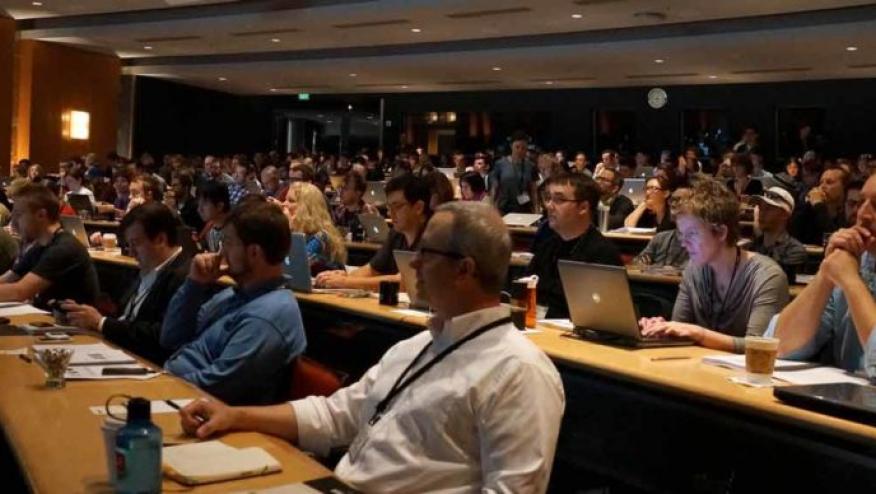Medical Meetings: Should I Stay or Should I Go? Save

Say a conference in your field was just announced. You think you "should" go, and you know you'll be choosing from many presentation opportunities that feature the latest research — which you want to know about. And you'll get to hang with like minds and talk about things that matter.
But time is at a premium, and because you won’t be at your practice, you may feel guilty. You wonder if going will make you more relevant or perhaps more attractive if you're seeking to make a career move. And given current technological advances, couldn't you just watch a webinar or, even simpler, read about it later?
Let's see what your peers, industry studies, and an expert who directs two very successful national conferences have to say.
Why Should You Attend a Conference?
A survey from Ogilvy Health Worldwide found that healthcare providers' reasons for attending looked like this from top to bottom:
- Learn about new clinical information
- Keep with current trends
- Get continuing medical education (CME)
- Participate in professional networking
- Collect material for personal knowledge
- Meet with specific company representatives
- Enjoy entertainment
- What your peers say about conferences
- Looks like Ogilvy's survey doesn't fall far from your peers' opinions about conferences.
"I attend two or three medical conferences per year, and I find them to be very beneficial," says Sylvia Stacy, M.D., M.P.H. "The main reasons are networking with others in the same field and keeping up to date on trends, advances and hot topics in the field. I'm an introvert, and I have to push myself to get out there and take advantage of everything that most conferences offer, such as sessions, roundtables, exhibit halls, mixers and workshops, but I never regret it when I participate in this stuff. I always take away a new relationship, a new piece of knowledge, a new professional goal or an idea to dwell on."
A chief medical officer, Richard Honaker, M.D., shares a rousing, "Go!" He says, "I love medical conferences. To remain board certified I need 50 hours of education every year. If I do not attend conferences I feel really out of date."
Pulmonary and critical-care physician Sachin Gupta, M.D., says, "Medical conferences come in a variety of styles and formats. As a subspecialist in pulmonary hypertension, I attend conferences related to this disease state as a means of learning about the latest in research, innovation and therapies."
He enjoys the entire experience and leaves the heavy lifting to speakers. "As a whole, conferences tend to be stress free, unless you are presenting a paper or poster," says Dr. Gupta.
It's also possible to be inspired by conferences, says anesthesiologist Sachin "Sunny" Jha, M.D., M.S., who remembers his first outing to the American Medical Association meeting in 2008.
"While there, I met and would become good friends with the current United States Surgeon General, was introduced to many mentors that have made a profound impact on my career and found a true path to leadership training and development — aspects of medical training which are severely lacking," Dr. Jha says.
Plastic surgeon Trent Douglas, M.D., tries to attend a few conferences each year, ideal for getting out of his local area to see things from a different perspective. "Since my aesthetic plastic surgery practice is in the very competitive San Diego market, I can ask questions of my colleagues in Dallas, Atlanta or Chicago and get candid responses that my direct competitors would not divulge. The exhibit halls are always full of the newest and latest technology and in-person attendance allows hands-on testing of the equipment and usually a 'trade-show' deal to be made."
He does acknowledge that although "more and more satellite meetings popping up," he still tries to attend one large meeting and one or two of the smaller meetings.
Is there a downside to conferences?
Of course, not everyone wants to go to conferences or goes to them. That said, here's some real food for conference thought. This 2012 opinion published in JAMA quoted John Ioannidis, M.D., formerly of Stanford University and now of the Harvard T. H. Chan School of Public Health. Dr. Ioannidis suggested that conferences might be more harmful than helpful to patients, beginning with the fuel waste, a.k.a., carbon, created by participants traveling via airplane to those conferences. He also suggests that presentation of abstracts "leads to mediocre curriculum vita building."
"Meetings may also create a branding system that builds the reputations of scientists working in the field and promotes herding after elevated prestigious opinion leaders," he says. "Power and influence appear plentiful in many of these meetings. Not surprisingly, the drug, device, biotechnology, and healthcare-related industries make full use of such opportunities to engage thousands of practicing physicians."
Maybe medical conferences will go their not-so-merry ways in the future, he postulates. "Medical conferences will disappear if physicians stop paying attention to them, if they do not give them value, and if they do not attend them; and, of course, if funders do not fund them," he says.
The latter scenario is not about to happen at the American Association of Family Practitioners (AAFP) as Clifton "Clif" Knight, M.D., will explain. He is AAFP's Senior Vice President for Education, and he oversees all AAFP activities related to medical education. He's also the lead for the Physician Health First initiative, so his team is integral to planning content for both of the association's popular conferences.
How conferences work to provide value
First, there's AAFP's FMX or the Family Medicine Experience Sept. 24–28 in Philadelphia. That one attracts some 5,000 physicians and is "highly rated," says Dr. Knight. "As to why some attend and some don't, it's about learning styles and preferences. We try to emphasize the opportunities."
Some sessions just pack 'em in. Attendees really latch on to the content and presentation from Frank Domino, M.D., says Dr. Knight. Dr. Domino shares latest updates in evidence-based medicine — no small task — and makes "all the bits and pieces" relatable and personal. The majority of sessions is designed for problem-based learning and includes case studies.
"Sessions for a few hundred people use the audience engagement system, during which the faculty poses questions to the group," Dr. Knight says. "We try to make sure it's very engaging in real time, adding value to being there in person. It's energizing."
The exhibit hall features opportunities to see the latest in medical technology, for recruiters and for hospitals and health systems, he says.
FMX's other major conference is more of a newbie, in its second year as the Family Physician Health and Well-being Conference, scheduled for Phoenix June 5–8. A headline theme this year is "The Best You in a Broken System."
With last year's conference attracting 450 attendees, Dr. Knight feels sure this year's will be even more popular. "People came together who were interested in sharing their concerns, and we're committed to trying to find solutions to help them feel a greater sense of connection to their purpose."
A survey of attendees produced gratifying results: 98 percent rated the conference excellent or above average. "One physician told us, 'I'm bringing my entire office staff next year.' Conferences like this provide things you really need, that you can't get from reading about it or streaming it," Dr. Knight says.
Editors Addendum
When RheumNow surveyed rheumatologists last year, we asked what determines if they attend a meeting or not? Rheumatologists said the most important factors in their choice was 1) City/Site/Venue, 2) meeting faculty, 3) program topics, 4) time away from practice, and 5) cost.
Check out RheumNow.Live










If you are a health practitioner, you may Login/Register to comment.
Due to the nature of these comment forums, only health practitioners are allowed to comment at this time.